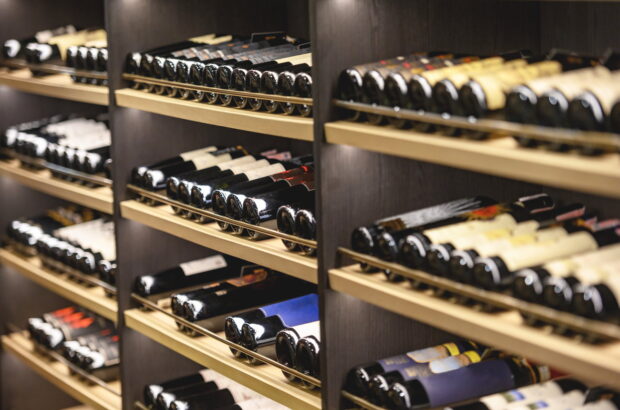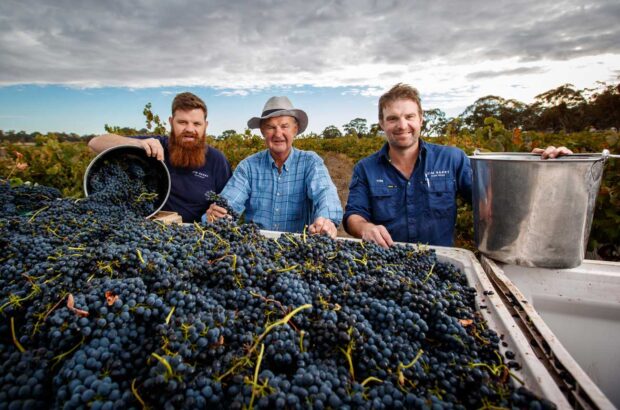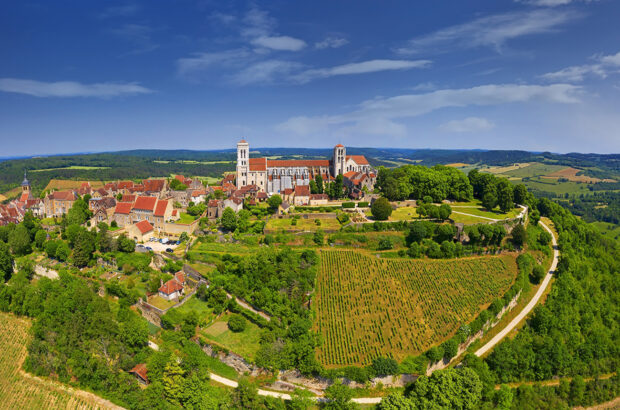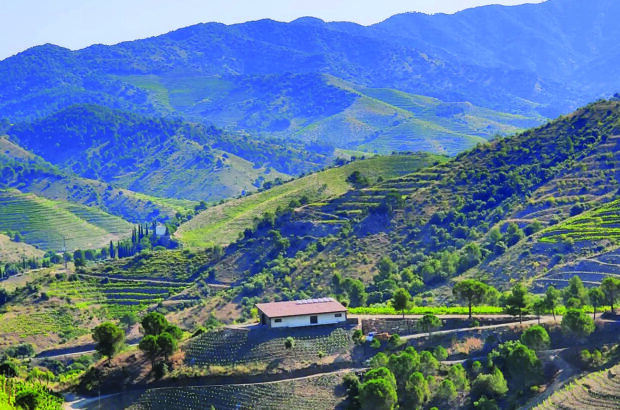I caught him on a day when top gear was just out of reach. A cold had dulled some of his energy, but even so Jean-Claude Mas was still wired into everything going on: the interview, buyers from a sizeable French supermarket chain, his Côté Mas restaurant, calls from other clients. Little escapes his attention and, as with most determined entrepreneurs, there’s the feeling that every moment counts.
It’s this focused, if autocratic temperament that has driven the success of Domaines Paul Mas, the company he launched in 2000. The Languedoc-based négocient-producer now accounts for 22 million bottles annually, 90% exported to 65 countries. The wines include those from the 15 properties he has acquired over the years (a total of just over 800ha), as well as those of the emblematic Arrogant Frog brand. ‘I’m motivated by success and hate failure,’ confirms Mas, still lean and curly-haired for his 55 years.
Jean-Claude Mas at a glance
Born 1964 in Béziers, son of a grower from Pézenas
Education Business school in Lyon and Nancy; MBA at Aston University (UK)
Career 1988 commercial attaché in Miami (USA); 1990 export director for northern Europe, Motul; 1992 export manager, Bernard Magrez’ William Pitters group (Bordeaux); 1996 commercial director, Domaines Virginie (Béziers); 2000 created Domaines Paul Mas
Family Married to Alexandra. Four daughters: Astrid, Elisa, Apolline, Estelle
Other interests Vintage cars, motor sport, Taekwondo
Call of the south
Viticulture runs in the family; his great-grandfather bought the first vines in 1892 and his grandfather and father subsequently followed in the vineyard. His Languedoc roots are deep, but the early years were spent escaping what appeared a natural destiny. Academic achievement allowed him to travel, a stint in the US opening his eyes to the development and success of New World wines among consumers.
Back in France, a position with motor oil manufacturer Motul ignited a passion for motor sports, but his DNA was clearly in wine, as was his next employment with Bernard Magrez’ William Pitters group in Bordeaux. International wine markets, Magrez’ global vision and the first of many encounters with legendary Italian oenologist Giorgio Grai were the defining experiences here.
Turning full circle, he arrived back in Languedoc in 1996 as the commercial director for Domaines Virginie in Béziers. Here, hew was able to hone his flair for marketing and develop his winemaking skills. ‘I have no formal training as a winemaker and learned everything on the job,’ he declares. In 2000 it was time to take the plunge: Domaines Paul Mas, named in homage to his father, launched on the back of the 35ha of family vineyard he had inherited. An old cellar in Montagnac, close to Pézenas, was used for winemaking and is today a modern production site and the company headquarters.
Purchased wine and grapes were also part of the deal from the start, and the négociant side of the business has since expanded dramatically. Mas is now the largest purchaser of grapes in Languedoc, with contracts extending over 1,500ha of vineyard. This allows a multitude of wines to be produced for a range of markets using a number of brand names, including Arrogant Frog, Côté Mas and La Forge Estate. The 45 or so grape varieties at his disposal permit both varietal (IGP, Vin de France) and appellation wines in his portfolio.

Château Paul Mas. Credit: Domaines Paul Mas
Mas-market
The inherent desire to own land has also remained strong, and since 2002 there have been a multitude of acquisitions. The Paul Mas vineyard has now expanded to 162ha, joined by, among others, Châteaux Teramas Astruc (now the principal winemaking and bottling site for the company) and Martinolles in Limoux, Domaine de la Ferrandière near Carcassonne, Château Lauriga in Roussillon, Château de Crès Ricards in Terrasses du Larzac and the most recent, Domaine Les Verrières in Grés de Montpellier in Languedoc. ‘There have been three reasons for expansion,’ he explains, ‘business requirements, a coup de coeur and to some extent the creation of a legacy.’
A yearly turnover that reached €55 million in 2016 has helped fuel the continued expansion, but what has been the recipe of his success? Undoubtedly, his work ethic has had more than a little to do with it. He spends a third of the year on the road visiting importers and clients in markets around the world and is quick to spot the potential for communication. In November 2018 he was in Montréal, Canada – one of the company’s top five markets – at the inaugural edition of the Somm360 Congress, a training and networking convention for sommeliers (from 20 different countries) training for the Master Sommelier (MS), Master of Wine (MW) or Wine & Spirit Education Trust (WSET) exams. In short, it was a ready-made venue for meeting the next generation of influencers in the wine world.
Then, of course, there was the business plan. In the late 1990s he noted a number of key points. First, the image of Languedoc was far better abroad than in France: a market that remained conservative and stuck in time; the perception of the region still le gros rouge qui tache (basically, plonk). Overseas markets and consumers were hungry for new wines, he realised, and did not view Languedoc in the same light. Second, although the region had made considerable progress, particularly with varietal wines, the wines were still being produced without the end-consumer in mind. ‘Quality grape varieties like Chardonnay or Cabernet Sauvignon were being produced like Aramon or Cinsault had been in the past, without any sort of signature,’ he says.
Hence, from the outset the Paul Mas wines were aimed at foreign markets, Jean-Claude adopting a New World attitude towards production and marketing. ‘I’ve always tried to use creative marketing to enhance the best that we can produce in Languedoc – the notion of value for money being an important element as well.’ The Arrogant Frog brand, a tongue in cheek characterisation originally aimed at the North American market, is a clear-cut example of this approach.

Apart from wine, vintage cares are one of Jean-Claude Mas’ passions. Credit: Domaines Paul Mas
Leaping ahead
As a marketing maestro, the fact that he also has considerable input into the winemaking side often comes as a surprise. There are about 140 different cuvées produced at Domaines Paul Mas, and Jean-Claude oversees everything without the aid of a consultant oenologist. ‘There isn’t a wine that leaves Paul Mas that I haven’t approved,’ he affirms. Blending is one of his strengths, and he also tries to be present at what he feels are the two critical moments during the harvest – at the beginning, when the organisation and strategy are put in place, and at the end. ‘It’s when fatigue kicks in and mistakes can be made simply by inattention.’
Stylistically, he has been influenced by his mentor, Giorgio Grai, as well as the Italian reverence for regional products. With regard to winemaking, Grai taught him two things: to be rigorous in his approach, but not to forget the notion of pleasure in a wine. Indeed, the Paul Mas wines are generally well made and adapted to the consumer, with evident fruit and supple texture and tannins.
If value for money has long been his mantra, he is now, he explains, in a new phase. With 18 years’ experience behind him, he has a better understanding of the differences in terroir, grape varieties and viticultural practices and wants to put that to good use making a range of superior wines, which will inevitably command higher prices. The result of this is what he calls the Noétic Collection, three cuvées (Clos Astelia, Laurinya and Silenus) from the best parcels at three of his properties. The first vintage of these limited-edition wines was the 2016, released in 2018.
Bigger vision
As with most producers these days, the use of chemicals in the vineyard is a subject that Mas has considered. He hasn’t played the organic card as strongly as neighbour and sometime competitor Gérard Bertrand, but is pushing gently in that direction. About 100ha of his 800ha are farmed organically, while the rest is cultivated sustainably. ‘In five to six years we will all be organic because the big chemical companies will produce a natural molecule to fight cryptogamic diseases, and viticultural practices will be adapted,’ he predicts.
Wine tourism is another contemporary topic and in true New World style he has launched a restaurant – Côté Mas, for which he has Michelin-star aims – and cellar door, and is working on other attractions like a vintage car museum and horse riding. The ideas are not wanting, just the time to put everything in place. ‘More needs to be done to attract people to the region,’ he says.
And what of Languedoc-Roussillon today? The region has progressed tremendously over the past 30 years but what else is needed to cap its reputation? ‘We’re getting there, but two ingredients are missing: a concise definition of what Languedoc-Roussillon is all about and a wine or wines that identify the region, like Sauvignon Blanc does New Zealand or Malbec in Argentina. I don’t think it will be Carignan, but perhaps as a region with a palette of grape varieties the message will be communicated by a blend or blends. Whatever, we need to find the code.’
Kicking against tradition, he also touts the Cabernet Sauvignon-Grenache cross Marselan as an exciting variety. ‘It improves blends and adapts to a range of terroirs. I’ve planted it in all our domaines and am already using it in the IGP blends.’ It won’t be everyone’s cup of tea, but it fits into Jean-Claude Mas’ New World, no-holds-barred concept of the region.
Paul Mas wines to try:












